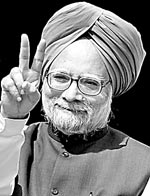
Indian PM challenges communist allies over nuclear deal with USNEW DELHI,Saturday (AP) – India's Prime Minister Manmohan Singh has challenged his communist party allies in a deepening rift over a nuclear deal with the United States, saying in a report Saturday they were free to withdraw their support from the government if they object to the pact.
The four-party, Left Front alliance said days ago that it rejected the deal, which allows India to buy nuclear fuel and technology from the U.S., and which has been hailed as the cornerstone of an emerging alliance between India and the U.S. ''I told them that it is not possible to re-negotiate the deal. It is an honorable deal, the Cabinet has approved it, we cannot go back on it,'' Singh said in an interview published Saturday in the Calcutta-based newspaper The Telegraph. ''I told them to do whatever they want to do, if they want to withdraw support, so be it,'' Singh was quoted as saying. Calcutta is a bastion of the communist parties. While the communists cannot torpedo the deal, which does not require parliamentary approval, they could bring down the Congress party-led governing coalition that they support from the outside. However, analysts said that while the communists would continue to oppose the deal and closer ties with the U.S., it was highly unlikely that they would bring the government down because they stood to lose too much if the opposition Hindu nationalists returned to power. ''The left will not let the government fall,'' said Pran Chopra, a New Delhi-based political analyst. The communist parties declined to comment on the remarks. Singh said in the interview that the communists only opposed the deal because ''they seem to have a problem with the U.S.'' During the Cold War, India largely supported the Soviet Union. The deal allows the United States to ship nuclear fuel and technology to India, which in exchange would open its civilian nuclear reactors to international inspectors. India's military reactors would remain off-limits. India also needs to make separate agreements with the U.N. nuclear watchdog, the International Atomic Energy Agency, and with the Nuclear Suppliers Group, an assembly of nations that export nuclear material. |
|| Front
Page | News | Editorial | Columns | Sports | Plus | Financial
Times | International | Mirror | TV
Times | Funday
Times || |
| |
Copyright
2007 Wijeya
Newspapers Ltd.Colombo. Sri Lanka. |
